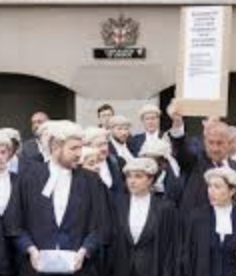
Barristers to go on strike

Barristers in England and Wales have voted to go on an indefinite, uninterrupted strike from 5 September, next month. Until now, members have been striking on alternative weeks in a dispute with the government over pay, working conditions, and legal aid funding,
The strike is expected to delay thousands of cases, leaving victims and the accused waiting longer for justice.
The Criminal Bar Association is asking for a 25 per cent rise in pay for legal aid work, representing defendants who could not otherwise afford lawyers. Members have rejected the government’s 15 per cent pay offer, saying it would not kick in immediately or apply to existing cases. Out of 2, 273 votes cast, an overwhelming 1, 808 members ( 79.5 per cent) voted to escalate the strike, while 258 were in favour of continuing the current action, and 207 were in favour of stopping all action.
If hearings or trials cannot take place because there are no barristers present to represent defendants, there won’t be any trials in which criminals are sent to prison and those who are innocent are acquitted.
Kirsty Brimelow QC vice-chair of the Criminal Bar Association said the strike action was a last resort and said “Barristers have had to endure collapses in their income and cuts and underfunding so that their income has decreased over 28 per cent since 2006”.
Justice Minister Sarah Dines said the decision by the barristers was “irresponsible”.
Opposition leader sir Keir Starmer himself a former barrister said the government was doing “absolutely nothing” to resolve industrial disputes including the row with criminal barristers.
Downing Street said it was a “disappointing decision” that would “force victims to wait longer for justice”.
A self-employed criminal barrister earned in the year 2019-20 about £79,800 according to an Independent review, the figure falls to a range of £ 55, 900 to 62, 900 once expenses are accounted for. Barristers with zero, one or two years of practice earned a median of £25, 100 before expenses and a net figure of £18, 800 after expenses.
